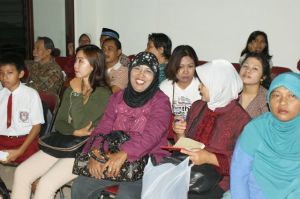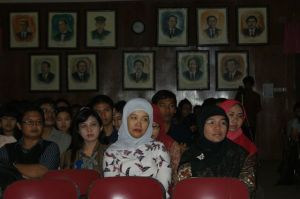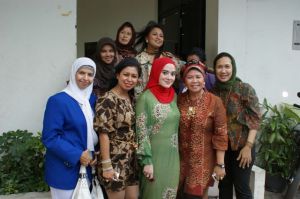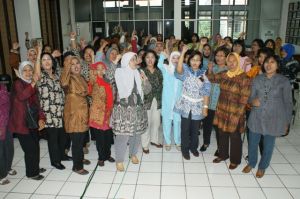 JAKARTA– I’m mid-way through a trip to Indonesia at the request of the State Department, and I’m finding a hard time putting the experience into words. You’d think after two years of writing about other countries it’d be easy. I can’t remember if it was always this hard, or there’s just something different about this trip.
JAKARTA– I’m mid-way through a trip to Indonesia at the request of the State Department, and I’m finding a hard time putting the experience into words. You’d think after two years of writing about other countries it’d be easy. I can’t remember if it was always this hard, or there’s just something different about this trip.
Maybe it’s the added surreal layer that this time, I’m flying around between seven far-flung cities in the world’s largest Muslim country talking about the importance of more Indonesian women starting companies.
Most people know the topic of “WHY AREN’T THERE MORE WOMEN IN SILICON VALLEY?” isn’t my favorite. Far too often the debate degenerates into grandstanding, whining and pointing fingers at all those evil male gatekeepers like, you know, TechCrunch. Never mind our company is run by a woman, our editorial group reports to another woman and more than half our senior staff are women.
But even worse, the debate has degenerated into pure linkbait. I rarely read anything new or thought-provoking on it. People glorify the need to RAISE AWARENESS, but who isn’t aware? Do you have eyes, and have you ever been to a tech conference? Then you’re plenty aware. We all are. Still hasn’t fixed the problem.
So while a lot of the women I’m talking to are expecting the fancy US expert to come in and tell them all how we’ve figured it out and what they should learn from us– I’m doing the opposite. I’m telling them how messed up it is in the world’s great meritocracy of Silicon Valley. I’m telling them that only about 20% of tech workers are women, despite more women graduating with math and science degrees than ever before. I’m telling them that only 15 Fortune500 companies have woman CEOs despite there being gender parity in terms of management jobs in the US, according to the World Economic Forum. I’m telling them that even though 40% of small businesses are women owned, only 8% of the venture funded startups are.
And then I’m telling them that for all the talk and handwringing about it, the smartest people I know can’t for the life of them figure out why that is. We have no idea why immigrants in Silicon Valley can do so much better in our country than American women can, and we have less of an idea how to fix it.
I tell them all the reasons people come up with and ask them if they face those things here in Indonesia. I tell them why I think some of those reasons are cop-outs and why some– like work-life balance– are legitimate issues that do keep women from starting businesses. I tell them how many professional women– me included–get trapped in feeling like pregnancy is a disability, rather than proof of how strong we are. And we talk about some solutions to make things better.
about some solutions to make things better.
Most of all, I’m telling them the easiest way to break a glass ceiling is to never create one, and urging groups to work hard to include women in Indonesia’s burgeoning private sector and entrepreneurial ecosystem now, while it’s just getting started.
It’s surreal for me, an American woman, to be telling audience after audience of women dressed in traditional Muslim headscarves that we don’t have gender equality figured out. But it’s more surreal for them to hear it. More than a few women have told me they were shocked. That they’d assumed women could do whatever they wanted in the US. A few have said that after my talk, they think starting a company sounds easier in Indonesia.
Sure, a few times a male in the audience has gone there. One fervently disagreed with my entire keynote saying that it was morally wrong for women to be out of the home and that if the government did anything to advocate this, it would be a nightmare for Indonesian society, birth rates would go into free-fall and all hell would break loose. It was a long diatribe, and my translator clearly gave me the nice version of his comments. Whether it was stated or not, the implication was there: What the hell are you doing out of the house half way around the world, crazy American lady? What’s wrong with your husband?
Another time, a man suggested that the US statistics proved that women shouldn’t start businesses. Turning my argument on its head, he suggested that the US economy doesn’t seem to be missing the participation of more women, and that it’d clearly been a positive for us. I pointed out that studies have shown that women-owned businesses become profitable faster and generate more revenue, and that the US economy isn’t exactly a global role model these days. There’s also the obvious retort– we have no idea what the opportunity cost from more women not participating in Silicon Valley’s economy has been. “Sorry, pal, but the facts just aren’t on your side,” I said, and the predominantly female audience laughed.
These are obviously viewpoints too un-PC to voice in the US, even if many people still believe them. But when each guy made these arguments, the women in the audience didn’t seem cowed or even too concerned. There was definitely some knowing-looks and eye rolling exchanged. “Oh there he goes again talking about how we need to stay in the house…” The attitude wasn’t preventing women from attending these events or the entrepreneurship colleges I’ve spoken at, where more than half of the audience have typically been women.
I’ve known from my previous trips to this country that Muslim Indonesians are very moderate and not at all like the stereotype many Americans would expect, particularly in more cosmopolitan urban areas. But during this trip, I’ve frequently been speaking at Muslim schools in more remote cities. My first talk was in a school so known for demonstrations that last week several classrooms were set on fire. And yet, even there the women don’t fit the meek-and-submissive stereotype as much as a few of the men would clearly like them to.
The brutality of Indonesian life– whether it’s 350 years of colonial domination, dictators, poverty or a never-ending assault of natural disasters– have forged these women into pure steel. Friends in the US have remarked at how intense it is that I’m here traveling city-to-city, lugging suitcases up and down jetway stairs in the tropical heat, delivering keynotes for more than three hours per day. Indeed, for an American pregnant woman, it is a pretty intense schedule. My ankles have morphed into thick, bloated stumps. Last week a clerk at a maternity store refused to let me carry a small bag of clothes to my car, I haven’t washed a dirty dish or stitch of laundry since my husband found out the news, and Paul Carr regularly takes my backpack from me when I try to leave the TechCrunch offices every night.
And yet, I met a woman the other day who runs a company delivering goods and services to remote villages. She has seven kids. When she was nine-months pregnant with number seven she was loading up her motorbike with supplies and winding around Indonesia’s crazy highways and dirt roads to continue her work. That, ladies and gentlemen, is intense. Is that woman going to be stopped by a man telling her she’s not strong enough to run a company? The idea made her laugh. She was sitting in the front row of one of my keynotes, and I don’t think I’ve ever seen a woman so confident and self-possessed. She was not only badass, she was well aware of just how badass she was.
Unlike shrill women advocates in the US, these women don’t care whether male gatekeepers try to keep them down; it doesn’t seem to affect them. They shrug and go after what they want anyway. That’s stunning because generally Indonesia is a culture that looks to the government to solve  most of their problems for them.
most of their problems for them.
I spent the afternoon in Jakarta the other day with a group called IWAPI– which translated stands for the Indonesian Businesswoman’s Association. The woman who runs it commanded the room with intense features, a bright red headscarf and an elaborate green silk dress. (She’s center in the picture to the left.) Throughout the meeting she snapped at her assistant– a man– to bring the water, fetch her bag, bring more chairs. My male state department guide looked a little scared. Before I could say anything she started to grill me on my qualifications. I knew one thing immediately: I never want this woman on my bad side.
But she uses that intensity to create opportunities for the 40,000 members of this organization that was started the year I was born. For instance, while some entrepreneurs in the country are complaining that new Asian trade agreements will flood the domestic market with cheaper Chinese goods, IWAPI is organizing its own collective trade missions to surrounding South East Asian countries, looking for new markets to offset the risk. The woman in green told me what she tells young women in Indonesia: The literal translation for the Bahasa word for entrepreneur is “a person who makes things happen.” “If you want things to be done for you, you’re not an entrepreneur,” she said. “You work for the entrepreneur.”
Many of the women I’ve met– including those at IWAPI– appear to do a much better job at the thing we fail at most: Women helping lift one another up. Last week, I visited a co-op in Surabaya, where women jointly run a hotel, a grocery store (below) and a sort of local Indonesian street vendor food court. They pool that money– and money from outside investors– to grant more than $1 billion rupiahs (or more than $100,000) in monthly microloans to their 12,000 women members. Operating well before microloans were trendy, this co-op has been in business 30 years.
monthly microloans to their 12,000 women members. Operating well before microloans were trendy, this co-op has been in business 30 years.
It was a hub of activity– women working at the various businesses, women helping watch one another’s kids, women in the computer lab learning how the Internet could help fuel their businesses, women in line to make payments on their loans. No one is worrying too much about work-life balance, because it’s a given many of them will have half-a-softball-team of kids. If they want to work, those issues are just reality. One of the many challenges of Indonesian life. One woman (pictured at the top of the post, waiting to make her monthly loan payment) had been a member for 20 years. She owns her own businesses and has seven kids and was welling up in tears telling me about the impact the co-op had made. That without it, she simply wouldn’t have been able to start a company. With it, her business had thrived and she’d never missed a payment.
The co-op’s board member opened my talk with a cross between a cheer and call-and-response prayer. Roughly it translated to:

How are your businesses doing?
“AWESOME!” The women yelled back raising fists in the air.
Are you paying your loans back?
“YOU BETTER BELIEVE IT!” they yelled.
Are you going to default?
“NO WAY!” they yelled, together dismissing the thought physically with an emphatic wave of their hands. As each of them told me their stories, the women clapped at every success milestone– nevermind they’d heard these stories all before.
Back at IWAPI, four of the women told me that not only were their husbands supportive of their companies– they’d done so well that their husbands had quit their jobs and were now working on the wives’ entrepreneurial dreams. Even my Indonesian state department translator was stunned to hear it. “There are two types of IWAPI husbands,” the uber-intense woman in green told me. “Those who are silent partners and support their wives, and those who become actual partners in the business.” Another woman in the group was living the harsh flipside of this statement. Her husband left her a single mother, because she refused to give up her fashion design company and sit at home while he worked. Her life isn’t easy, but she has no doubt she made the right choice.
I don’t mean to paint the picture of some gender utopia. In each case, these were women that opted to attend a talk about entrepreneurship, so it may not be a relative sample of the population. And to be sure, questions come up about pressure from society to raise kids and men not taking them seriously; the same issues women talk about in the US. When I’ve brought up some of the issues we face, there’s a lot of head nodding in the audience and commiserating laughter. Some of this is just international, it seems.
But the difference among the women I’ve met so far in Indonesia is they just don’t seem to dwell on it. They’ve got more important things to do.